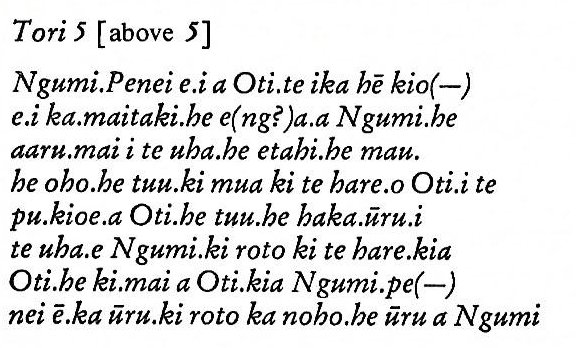
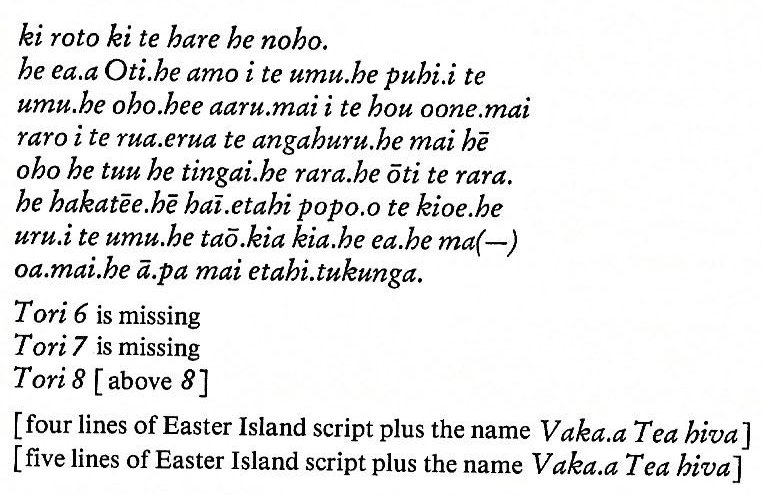
|
Tori 4
E: 4 |
|
kaā
hahata rō.he hakatopa i te kioe.ki ra(-) |
| Gaaha, to burst,
to become ruptured, to have a discharge of pus, of
blood. Ku gaaha te toto o te ihu. He had a
nose-bleed. E û'i koe o gaaha te îpu. Be
careful not to break the bottle (lit. look out lest
the bottle burst). E tiaki á au mo gaaha mai o te
harakea. I shall wait for the abcess to burst.
Gaatu, totora reed. Vanaga. To break, to
split, to crack, to rive; fracture, fissure, break,
crack, crevice (gaaha); niho gaa,
toothache, broken teeth; gaamiro (miro,
ship) shipwreck; gaàpu (pu 2),
abortion; poki gaàpu, abortive child. T Mq.:
naha, nafa, split, fissure. Ta.:
aha, afa, crack fissure. Gaatu 1.
Bulrush, reed. 2. (gatu). Churchill. Hahata = open up
[E:19].
He-hahata te ava o te henua,
a crevice opened in the ground.
Ka hahata
ro te pu =
after the hole was deep enough ... [E:34].
The Rat was put down into the pit - he hakatopa i
te kioe.ki raro ki te rua.
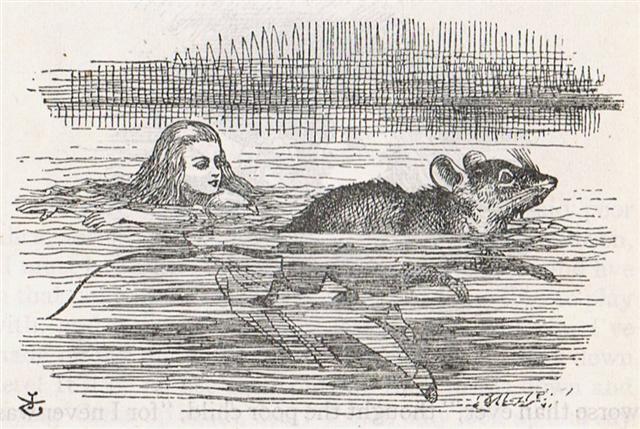
... In China, with Capricornus,
Pisces, and a part of Sagittarius, it [Aquarius]
constituted the early Serpent, or Turtle, Tien
Yuen; and later was known as Hiuen Ying,
the Dark Warrior and Hero, or Darkly Flourishing
One, the Hiuen Wu, or Hiuen Heaou, of
the Han dynasty, which Dupuis gave as Hiven Mao.
It was a symbol of the emperor Tchoun Hin, in
whose reign was a great deluge; but after the
Jesuits came in it became Paou Ping, the
Precious Vase. It contained three of the sieu, and
headed the list of zodiac signs as the Rat,
which in the far East was the ideograph for 'water',
and still so remains in the almanacs of Central
Asia, Cochin China, and Japan ... |
| ro ki te rua.he hakarere.he
hangai.hai ku(-) Hakarere ki raro,
to put down.
Hâgai. To feed. Poki hâgai,
adopted child. Vanaga. To feed, to nourish,
foster-parent (agai); hagai ei u, to
suckle. P Pau.: fagai, to feed, to maintain,
to support. Mgv.: agai, to nurse, to nurture,
to give food to, an adoptive or foster father;
akaagai, to feed. Mq.: hakai, to feed.
Ta.: faaai, to nourish, a foster-parent.
Churchill.
Hai: 1. With (instrumental). 2. To,
towards. He oho hai kona hare, to go home.
He oho hai kona hagu, mo kai, to go where there
is food to eat. 3. Give me: hai kumara, give
me some sweet potatoes. Ha'i: 1.To give, to
deliver, to hand over. 2. To carry under the armpit.
3. To hug, to embrace. 4. To wrap up; parcel,
packet. Ha'iga, armpit. Haîara, to
guide, to direct (someone). Ka haîara koe i taaku
poki ki te kona rivariva, guide my son to a good
spot. Vanaga. 1. To wrap up, to make into parcels,
to envelop; food tied up in bundles (ai). PS
Sa.: sai, a tightly bound bundle. To.:
haihai, to tie up in a bundle. Fu.: sai,
to tie; saisaiga, a bundle. Niuē:
hai, to
tie fast. 2. To carry, to transport. Ta.:
afai, to carry an
object, to transport; afafai,
capable of carrying a heavy burden, to carry here
and there. 3. To be in heat, to copulate, to
embrace; concupiscence, fornication, impurity;
lascivious, impure (ai).
P Ta.: ai,
to copulate. Haiga,
armpit. PS Sa.: fa'iga,
a joint. Haipo,
heart; haipo rahirahi,
shortness of breath. Mq.: houpo,
heart. Haite
(ha
causative, ite)
numeral. Churchill. Pau.: haifa,
virile, manly. Ta.: aiaha,
a brave young warrior. Churchill. Mgv.:
hai, a fish. Ta.:
fai, the
stingray. Mq.: fai,
hai, id.
Sa.: fai,
id. Ma.: whai,
id. Haihai,
evening (metathetic). Sa.: afiafi,
id. Churchill.
Kumara. Sweet potato. The main varieties
are: kumara pita, kumara rega moe tahi uriuri,
kumara rega moe-tahi teatea, kumara rega vî'e,
kumara aro piro, kumara paka taero, kumara ariga
rikiriki, kumara uriuri, kumara ûka teatea, kumara
ure omo, kumara ha'u pú, kumara ure omo uriuri.
Vanaga. Sweet potato. P Pau., Mgv.: kumara,
id. Mq.: kumaá, id. Ta.: umara,
umaa, id. Churchill. (Where) he fostered (nourished) the Sweet Potato
(?) - he hangai.hai kumara. |
|
mara.ai ka hoa no.i te kumara.te raa te raa. Ai, aai 1. Who:
interrogative pronoun used in place of koai te
mee...: Aai i-tu'u-mai-nei, e-haúru-ró-ana
au? = Koai te mee i-tu'u-mai-nei, e-haúru-ró-ana au?
Who is it who came here when I was sleeping? 2.
Whose: genitive pronoun. Vanaga. 1. (Ko ai)
Who, which. 2. Then. 3. Consequence. 4. (Hai).
Churchill.
Ka. Particle of the affirmative
imperative, of cardinal numerals, of independent
ordinal numerals, and of emphatic exclamation, e.g.
ka-maitaki! how nice! Vanaga. Ká. 1.
To light a fire in order to cook in the earth oven
(see umu): he-ká i te umu, he-ká i te kai. 2.
Figuratively: to fire up the soul. To put oneself in
a fury (with manava): ku-ká-á toona manava he
has become furious. Vanaga. 1. Of T. 2.
Imperative sign; ka oho, ka tere,
ka ea, begone!; ka ko iha, a greeting T;
ka mou, hush; ka oho, goodbye. 3.
Infinitive sign; mea meitaki ka rava, a thing
good to take; ka harai kia mea, to accompany.
4. A prefix which forms ordinals from cardinals. 5.
The dawning of the day. 6. Different (? ke).
Churchill.
Hoa. 1. Master, owner; tagata
hoa papaku, owner or relative of a dead; hoa
manu, 'bird master', that is, he who received
the first egg at the annual festivals in Orongo;
he to'o mai e te hoa manu i te mamari ki toona
rima, he ma'u, he hoko, the 'bird master'
receives the egg in his hand and carries it,
dancing. 2.Friend,
companion: e ga hoa ê! 3. To cast away, to throw
away, to abandon, perhaps also to
expel. 4. To confess a sin; he hoa i te
ta'u: term used of a category of rongorongo
boards (see ta'u). Vanaga. 1. Friend;
repa hoa, friend (male), comrade, companion,
fellow; to confide; repa hoa titika, faithful
friend; garu hoa, friend (either sex); uha
hoa, friend (female); hoa kona, native T.
2. To abandon, to debark, to cast, to launch, to
anchor, to let go, to give up, to reject, to
repudiate, to suppress, to cut off, to jerk out, to
proscribe, to reprove; hoahoa, to upset, to
destroy. Churchill.
No.
Just, only, merely, still; ka-oho-nó, just
go! e-tahi nó i-ora-ai, only one survived;
e-haúru-nó-á, he is still sleeping; e-aga nó,
he just works (i.e. he always works). Vanaga. 1.
Of (na); no te mea, because (of the
thing); no te ragi, celestial (of the sky);
no ira, wherefore (of that). 2. Intensive;
hakapee no kai hoao, abundance; riva no iti,
convalescence; haga no iti, to plot mischief;
hare itiiti no, hut; no mai,
intensive, spontaneously; tuhi no mai, to
accuse; hiri tahaga no mai, to go on without
stopping; topa tahaga no mai, wholly
unexpected. 3. Exclusive, unique, that and naught
else; gutu no, vain words; noho no,
stay-at-home, apathy. Churchill.
Thus by (ai) the dawn (ka) wholly (no)
suppressed (hoa) (?)-
ai ka hoa no. |
| I. 1. Preposition
denoting the accusative: o te hanau eepe i-hoa i
te pureva mai Poike ki tai, the hanau eepe
threw the stones of Poike into the sea. Te
rua muraki era i a Hotu Matu'a. the grave where
they buried Hotu Matu'a. 2. Preposition: for,
because of, by action of, for reason of...,
ku-rari-á te henua i te ûa the ground is soaked
by the rain; i te matu'a-ana te hakaúru i te kai
mo taana poki huru hare, the mother herself
carries (lit.: by the mother herself the taking...)
the food for her son secluded in the house. 3.
Preposition: in, on, at (space): i te kaiga nei,
on this island. 4. Preposition: in, on (time):
i mu'a, before; i agataiahi,
yesterday; i agapó, tonight; i te poá,
in the morning. 5. Preposition: in the power of:
i a îa te ao, the command was in his power. 6.
Adverb of place: here. i au nei, I am here
(also: i au i , here I am, here). Vanaga. Î.
Full; ku-î-á te kete i te kumara, the bag is
full of sweet potatoes. 2. To abound, to be
plentiful; ki î te îka i uta, as there are
lots of fish on the beach. 3. To start crying (of a
baby): i-ûi-era te ma-tu'a ku-î-á te poki mo
tagi, he-ma'u kihaho, when a mother saw that her
baby was starting to cry she would take it outside.
Vanaga. Toward; i muri oo na, to accompany.
Churchill. Ii, to deteriorate, to go bad.
Churchill.
Raa.
Sun; day; i te raá nei, today; raá îka,
good day for fishing. Vanaga. 1. Sun. 2. Day. 3.
Time. 4. Name of sub-tribe. Fischer.
Te manu i te raá
= comet. Barthel.
'... The substitution of the sun for the sail, both
of which are called ra or raa in
Polynesia, is a remarkable feature in Easter Island
art ... ' Heyerdahl 3. 1. The sun;
raa ea mai,
raa puneki,
sunrise; raa tini,
raa toa,
noon. P Mgv., Ta.:
ra, the sun. Mq.:
a, id. 2.
Day, date; a raa nei
a, to-day, now;
raa i mua,
day before. P Mgv., Ta.:
ra, a
day. Mq.: a,
id. Churchill. '... The chief
thus makes his appearance at Lakeba from the
sea, as a stranger to the land. Disembarking at the
capital village of Tubou, he is led first to
the chiefly house (vale levu) and next day to
the central ceremonial ground (raaraa) of the
island ...' (Islands of History)
Ta.: toraaraa,
to raise up. Churchill 2. LA, s. Haw.,
sun, light, day. N. Zeal., ra, sun, day.
Marqu., a, id. Sam., la, id. Deriv.:
Haw., lae, be light, clear, shining; lai,
shining as the surface of the sea, calm, still;
laelae and lailai, intens. Sam., lelei,
something very good; lala, to shine;
lalangi, to broil. Fiji., rai, to see,
appear; rai-rai, a seer, a prophet. Teor.,
la, sun. Aru Islands, lara, id.; rarie,
bright, shining. Amblaw., laei, sun, day.
Irish, la, lae, day. Laghmani (Cabul),
la'e, day. Sanskr., laj, lanj,
to appear, shine; râj, to shine. Ved., to
govern; s. a king. If, as Benfey intimates,
the Sanskrit verb bhrâj, to shine, to beam, is
'probably abhi-râj', an already Vedic
contraction, then the Polynesian root-word al
and lae will reappear in several of the West
Aryan dialects. Lat., flagrare, flamma,
flamen. Greek, φλεγω,
φλοξ.
A.-Sax., blac,
blæcan,
&c. Probably the universal Polynesian lani,
langi,
rangi,
ra'i,
lanits
(Malg.) designating the upper air, sky, heaven, and
an epithet of chiefs, refers itself to the same
original la,
lai,
lanj,
referred to above, to which also be referred: Welsh,
glan,
clean pure, bright, holy. Sax. clæne,
clean, pure. Swed., ren,
clean. pure; grann
(?), fine, elegant. It may be noted in connection
with this word, either as a coincidence or as an
instance of ancient connection, that in the old
Chaldean the name of the sun and of the Supreme
Deity was Ra,
and that in Egypt the sun was also named
Ra. LA²,
s. Haw., Sam., Tong., ra.
N. Zeal., the sail of a canoe; abbreviated from, or
itself an older form of, the Fiji. laca,
a sail, also the mats from which the sails were
made. Sunda., Mal., layar,
sail. Malg., laï,
sail, tent, flag. Sanskr., lâta
(Pictet), a cloth; latâ
(Benfey), a creeper, a plant; lak-taka,
a rag. As mats and clothing in primitive times were
made of bark or flexible plants, the connection
between the Sanskrit latâ
and Polynesian laca,
la,
becomes intelligible. Armen., lôtig,
a mantle. Lat., lodix,
a blanket. Irish, lothar,
clothing. Fornander.
(in order to) 'raise
up' (toraaraa) sweet potatoes (?) -
i te kumara.te raa te raa. |
| he
tuu ki te tahi mamara he ui.a Oti.ku pi(-) (When) a month had gone
by - he tuu ki te
tahi mamara
Ui. To ask.
Vanaga. Û'i.
To look, to look at (ki); e-û'i koe!
look out! Vanaga. Ui.
1. Question, to interrogate, to ask (ue).
Uiui, to
ask questions. 2. To spy, to inspect, to look at, to
perceive; tagata ui,
visitor. Churchill.Ku. Verbal prefix, used
for past events the effects of which are still
lasting. The verb then takes the suffix -ana
which is very often contracted to -á . In
familiar conversation the prefix -ku is often
omitted and only the suffix -á is used.
Vanaga. 1. I; kia ku, me. 2. Verb sign: ku
ohoa, to keep out of the way, absence; ku
higaa, convinced; ku taie te tai, to
overflow, to go beyond; ku magaro, to
reconcile. 3. ? tae he mau ku hoao,
abundance. 4. Akaku, to be moved, affected;
hakaku, to groan. Mgv.: ku, an
exclamation, a cry used when one has hit the mark
aimed at. Mq.: ú, an exclamation of sorrow.
5. Gaoku, to eat greedily. Mgv.: ku,
to be satiated, glutted. Churchill. KU, v.
Haw., to rise up, stand, let go, let fall, hit,
strike against, resist; ku-e, to oppose,
resist; ku-i, to pound, beat, knock; ku'-u,
let go, loosen, put down; ku-ku, to strike,
beat, stand up, be high, excel; ku-a, to
strike horizontally, to cut down, as trees, to fell,
throw away. N. Zeal., tu, stand; tuki,
beat, knock; tuku, allow, permit. Sam., tu,
stand up, arise, to take place, come to pass; s.
a custom, habit; tu-i, to thump, beat, pound;
s. a blow with the fist, a curse; tu'ia,
to strike, as the foot against a stone; tu'i-fao,
a blacksmith (mod.), lit. a pounder of nails;
tu'u, to place, appoint, permit, let go, set
free, cut down, desist. Tah., tu, stand
erect, to fit, agree; tu-a, to cut, to rest
or wait; tu-e, to impel, strike with the
foot, hit against; tu'e-tu'e, to oppose;
tu-i, to butt, strike, smite; tutu, to
strike, beat; tu'u, let go, dismiss, yield.
Fiji, tu, to stand; tuki, beat, knock;
tuku, let go, slack up: Sunda, tutut,
loose, slack. The same dialectical variations in
form and sense obtain through all the Polynesian
groups. Two original conceptions seem to have
attatched themselves to the Polynesian root-word
ku, tu, viz., (1.) 'To rise, stand, be
prominent'; (2.) 'To strike, put down, let go.' The
West Aryan relatives of this Polynesian ku,
tu, appear to have confined themselves to the
second conception of the word, 'to strike, put down,
let go', although the probably oldest of these
forms, the Vedic tu, bears the general sense
'to be powerful'. To mention but a few of these
Aryan correlatives, we find - Sanskr., tu
(Ved.), be powerful, to increase, to hurt; tuy
and tunj,
to strike, push, abide, give or take; tud, to
strike, sting; tund, be active; tup,
tump, tumbh, to hurt, kill; khud
(Ved.), kshud, to push, to pound. Lat.,
cudo, strike, beat, sting; incus, an
anvil; tundo (tutudi), to beat,
strike, pound; tussis, a cough; tueor,
guard, watch, keep; tutus, safe; tuber,
tumor, tumulus; stupeo, be
stunned, benumbed. Greek, τυπος,
a blow; τυπτω,
έτυπτον,
to beat, strike; τυλη,
τυλος, a
knot or callus, a lump, hump, knob, a cushion;
τυλυγμα,
a wheal, swelling: Liddell and Scott refer this
latter to Sanskrit tu.
Goth., stautan,
to strike, smite. Germ., stossen.
Dutch, stooten.
Benfey (Sanskr.-Engl. Dict.) s. v. Tud,
considers that the Gothic has retained an original
s, which
the Sanskrit and the other dialects have lost. With
all due deference to so great authority, yet, if
Professor Max Müller is correct, that the oldest
forms of Aryan speech consisted of open syllables of
one consonant and one vowel, or of one vowel, and
judging from the analogy of the Polynesian, I should
look upon all prefixes and suffixes to a simple root
or stem as of later growth, and hence that the
s in
question, like the s
in stupeo,
indicates a later period than that when tu
or tup
were used to express the sense of striking, beating,
stunning. Anc. Slav., kuti
or kowati,
a smith. Lith., kujis,
a hammer; kauti,
to fight. Fornander.
Piere.
Thousand; ka-piere, ka-piere, thousands
and thousands (meaning: many, lots and lots).
Vanaga. 1. A thousand, a great number. 2. Resin (?
Fr.: brai); piere hiva, tar, pitch;
akui ei piere hiva, to tar. Hakapierehiva,
to tar. Churchill.
Ana. 1. Cave. 2. If. 3. Verbal prefix:
he-ra'e ana-unu au i te raau, first I
drank the medicine. Vanaga. 1. Cave, grotto, hole in
the rock. 2. In order that, if. 3. Particle (na
5); garo atu ana, formerly; mee koe ana te
ariki, the Lord be with thee. PS Sa.: na,
an intensive postpositive particle. Anake,
unique. T Pau.: anake, unique, to be alone.
Mgv.: anake, alone, single, only, solely.
Mq.: anake, anaé, id. Ta.: anae,
all, each, alone, unique. Anakena, July.
Ananake, common, together, entire, entirely, at
once, all, general, unanimous, universal, without
distinction, whole, a company; piri mai te tagata
ananake, public; kite aro o te mautagata
ananake, public; mea ananake, impartial;
koona ananake, everywhere. Churchill.
Splendor; a name applied in the Society Islands to
ten conspicious stars which served as pillars of the
sky. Ana appears to be related to the
Tuamotuan ngana-ia, 'the heavens'. Henry
translates ana as aster, star. The
Tahitian conception of the sky as resting on ten
star pillars is unique and is doubtless connected
with their cosmos of ten heavens. The Hawaiians
placed a pillar (kukulu) at the four corners
of the earth after Egyptian fashion; while the Maori
and Moriori considered a single great central pillar
as sufficient to hold up the heavens. It may be
recalled that the Moriori Sky-propper built up a
single pillar by placing ten posts one on top of the
other. Makemson.
Na. Ná,
here; ná ku-tomo-á te miro, the boat has
arrived here. Vanaga. 1. When, as soon as (ga).
Mgv.: na, because, seeing that, whereas. 2.
The, that, some, any, certain (ga); pei na,
thus, like that. P Mq.: na, the (plural).
Ta.: na, id. 3. Of. P Pau.: na, of,
belonging to. Mgv.: na, of, by, on account
of. Mq.: na, of, by, for, on the part of.Ta.:
na, of, by, for. 4. ? possessive; na
mea, to belong to (? his thing). Mgv.: na,
him, of him, to him. Ta.: na, he, his, him.
5. (ana 2); i muri oo na, to
accompany. Churchill.
Kiore. Rat. Vanaga. Rat, mouse; kiore
hiva, rabbit. P Pau., Mgv.: kiore, rat,
mouse. Mq.: kioē,
íoé, id.
Ta.: iore,
id. Churchill. |
|
ere.ana.te kioe. Oti perceived lots and
lots of rats (they had multiplied) - he
ui.a Oti.ku piere.ana.te kioe. |
|
Five lines of
Easter Island script (of unknown origin) plus the
name Vaka.a Tea hiva.
(The Eighth
Land, p. 290.) |
| he
haka.hetu. a Oti.i taana.kiōe. he tuu. Hetu 1. To (make)
sound; figuratively:
famous, renowned. 2. To crumble into embers (of a
bonfire). Hetu'u. Star, planet;
hetu'u popohaga
morning star; hetu'u ahiahi evening star; hetu'u viri
meteorite. Vanaga. Hetu 1. Star (heetuu);
hetu rere, meteor; hetu pupura,
planet. P Pau.: hetu, star. Mgv.: etu,
id. Mq.: fetu, hetu, id. Ta.: fetu,
fetia, id. The alternative form fetia
in Tahiti, now the only one in common use, need not
be regarded as an anomaly in mutation. It seems to
derive from Paumotu fetika, a planet. Its
introduction into Tahiti is due to the fashion of
accepting Paumotu vocables which arose when the
house of Pomare came into power. 2. Capital
letter (? he tu). 3. To amuse. 4. To stamp
the feet. Hetuhetu, to calk, to strike the
water. Hetuke, sea urchin. Churchill.
Kio. 1. Defeated; one who has taken refuge in a
house or in a cave. 2. To come out a winner, to win,
to be victorious in war, in a quarrel, in a race:
ku-kio-á te taûa i a Miru, the war was won by
the Miru; ku-kio-á te toru vaka, the third
boat won. Kiokio, to smell of smoke, to smell
smoky (of food). Vanaga. 1. Stick wherewith to rake
things into a heap. 2. Slave, servant, inferior, of
low estate, husbandsman. Hakakio, to enslave,
to reduce to subjection; tagata hakakio,
master. Mgv.: kio, a servant, slave, tiller
of the soil. 3. To discourage; also kioa.
Kiokio, foul smelling smoke. Mgv.: kio,
kiohe, to extinguish, to put out a light. 4.
Pau.: kiokio, to chirp. Mgv.: kio, id.
Ta.: ioio, to cry, said of a baby. Mq.:
kiokio, to chirp. Sa.: 'io, id. Ha.:
ioio, id. 5. Mgv.: kio, little, small,
said of birds and animals. Mq.: kio, young of
birds. 6. Mgv.: kiokio, a fish. Mq.:
kiokio, id. 7. Mq.: kio, said of women
and children who run away to the mountain shelters
in time of war. Ha.: kio, to flee, to hasten
away in fear. Churchill. Hakakio, festival of
thanksgiving. Barthel 2.
Ore.
1. Ha., ole, to speak through the throat,
guttural, or through a trumpet; name of a large
sea-shell; ole-ole, talk thickly or
indistinctly, as one angry or scolding, to grin like
the idols; olo, to be loud, as a sound, as a
voice of wailing; olo-olo, intens. to roar,
rush, as the sound of waters. Sam., ole, to
ask, to beg; olo, to ooo as a dove;
faa-olo, to whistle for the wind. Ta., oro-io,
to grieve to death; ta-oro-oro, make a noise,
rumble at the bowels. To., kole, to beg.
Fiji., kodrau, to squeal; qolou, to
shout. 2. Ha., ole, the eye-tooth, name of a
fish; ole-ole, to make notches in anything,
to dovetail two pieces together. Ta., ore-ore,
the teeth of sharks or of the ono fish.
Fornander.
Kore. To lack, to be missing; without
(something normally expected), -less; ana kore te
úa, ina he vai when rain lacks there is no
water: vî'e kenu kore, woman without a
husband, i.e. widowed or abandoned by her husband.
Vanaga. Not, without (koe); e kore,
no, not; kore no, nothing, zero; kore noa,
never, none; hakakore, to annul, to nullify,
to annihilate, to abrogate, to acquit, to atone, to
expiate, to suppress, a grudge. T Pau.: kore,
not, without. Mgv.: kore, nothing, not,
without, deprived of; akakore, to destroy, to
annihilate. Mq.: kore, koé, óé,
nothing, not, finished, done, dead, destroyed,
annihilated, without. Ta.: ore, no, not,
without. Korega, nothing, naught. Churchill.
Oti became famous for being fearless (?) -
he haka.hetu. a Oti.i taana.kiōe (kio-ore). |
| ki
te.tahi.tau.hē ngaroa.e te.Tanga(ta).ko Garo.
1. To disappear, to
become lost. He tere, he garo. He ran away
and disappeared. He û'i te Ariki, ku garo
á te kaíga i te vai kava. The
king saw that the land had disappeared in the sea.
I te ahiahi-ata he garo te raá ki raro ki
te vai kava. In the evening
the sun disappears under the sea. Ku garo á te
kupu o te tai i a au. I have forgotten the words
of the song (lit. the words of the song have become
lost to me). Ina koe ekó garo. Don't
disappear (i.e. don't go), or: don't get lost on the
way. 2. Hidden. Te mana'u garo, hidden
thoughts. Kona garo o te tagata, 'people's
hidden places': pudenda. Vanaga. To disappear, to
stray, to omit, to lose oneself, to pass, absent, to
founder, to drown, to sink; garo noa, to go
away forever, to be rare; garo atu ana,
formerly. Hakagaro, to cover with water;
hakagaro te rakerakega, to pardon. Garoa,
loss, absence, to be away, to drown, not
comprehended, unitelligible. Garoaga,
setting; garoaga raa, sunset, west.
Garoraa, the sun half-set. Garovukua, to
swallow up. Churchill.
... Then
King Matua said to Hotu, 'You must not forget [he
mee o rehu] the flies [te takaure] when
you take along (all the things that are necessary)
and sail off. If you forget the flies [ana rehu i
a koe te takaure], the multitude (piere)
of the people will disappear [he ngaro tou piere].
When you reach the land [ana tomo ki runga.ki tou
kainga] to which you are travelling [ena koe
ka oho], it will be over quickly (?) for the
multitude of the people.
When the flies die [ana moko te ihu o te takaure],
the human population dies too [he moko tokoa te
ihu o tou piere tangata].' [E:57]
Taga. 1. Act, business,
anecdote; taga poki, anecdote, nonsense,
story, puerile, childish. 2. Sack. PS Sa., Fu., Niuē,
Viti: taga,
a bag. To.: taga,
the colon; tagai,
a sack. Churchill.
The first 'year' arrived, after the disappearance of
Not-Tangaroa (i.e. Tane) -
he tuu.ki
te.tahi.tau.hē (he-e) ngaroa.e te.Tanga(ta)
... There is a couple residing in
one place named Kui [Tui] and
Fakataka [Hakataka]. After the couple
stay together for a while Fakataka is
pregnant. So they go away because they wish to go to
another place - they go. The canoe goes and goes,
the wind roars, the sea churns, the canoe sinks.
Kui expires while Fakataka swims.
Fakataka swims and swims, reaching another land.
She goes there and stays on the upraised reef in the
freshwater pools on the reef, and there delivers her
child, a boy child. She gives him the name
Taetagaloa. When the baby is born a golden
plover flies over and alights upon the reef.
(Kua fanau lā te pepe kae lele mai te tuli oi tū
mai i te papa). And so the
woman thus names various parts of the child
beginning with the name 'the plover' (tuli):
neck (tuliulu), elbow (tulilima), knee
(tulivae)
...
... I knew of two men who lived
in another settlement on the Noatak river.
They did not believe in the spirit of the string
figures, but said they originated from two stars,
agguk, which are visible only when the sun has
returned after the winter night. One of these men
was inside a dance-house when a flood of mist poured
in ... His two companions rapidly made and unmade
the figure 'Two Labrets', an action intended to
drive away the spirit of the string figures,
uttering the usual formula ... but the mist kept
pouring in ...
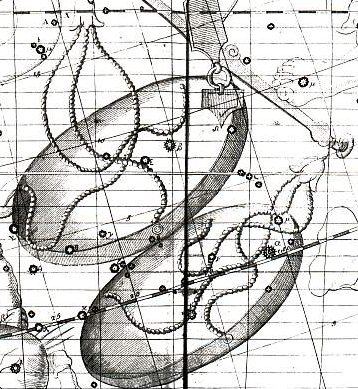 |
|
Tori 5
E: 5 |
| Ngumi.Penei e.i a
Oti.te ika hē kio(-)
Ika. 1. Fish. 2. In some cases, animal in
general: îka ariga koreh[v?]a, animal with
the face of a koreva fish (name given to
horses when they arrived on the island, because of
the resemblance of their heads with that of a
koreva). 3. Victim (wounded or killed), enemy
who must be killed, person cursed by a timo
and destined to die; îka reirei, vanquished
enemy, who is kicked (rei). 4. Corpse of man
fallen in war. Vanaga. 1. Fish, animal; ika rere,
flying fish; ivi ika, fishbone; mata ika,
pearl. P Pau., Mgv., Mq.: ika, fish. Ta.:
ia, id. 2. Prey, victim, sacrifice; ika ke
avai mo, abuse; hakarere ki te ika, to
avenge. T Mgv.: ikaiara, to quarrel;
ikatamamea, to be angry because another has
handled one's property. Mq.: ika, enemy, what
causes horror. Ma.: ika, the first person
killed in a fight. Mangaia: ika, a victim for
sacrifice. 3? matamata ika, snow. Ikahi,
to fish with a line, to angle. Mq.: ikahi,
id. Ikakato, to go fishing. Ikakohau,
to fish with a line, to angle. Ikapotu, cape,
end of a voyage, destination; ikapotu hakarere,
to abut, to adjoin; topa te ikapotu, id.;
tehe oho te ikapotu, id.; mei nei tehe i oho
mai ai inei te ikapotu, as far as, to.
Ikapuhi, to fish with a torch. Mq.: ikapuhi,
id. Churchill.
Ngumi - that's why (penei
e) for Oti (i a Oti) the fallen victim (te
ika), i.e. (he-e) the rat (kioe),
was a good 'fish' (i ka.maitaki). |
| e.i ka.maitaki.he
e(ng?)a.a Ngumi.he
Maitaki. Clean, neat, pure, pretty, nice,
beautiful, handsome; tagata rima maitaki,
clean-handed man, correct man. Vanaga. 1. Good.
Henua maitaki = the good earth. 2. Shine.
Marama maitaki = the shining moon. Barthel. Ce
qui est bon. Jaussen according to Barthel.
Meitaki, good, agreeable, efficacious,
excellent, elegant, pious, valid, brilliant,
security, to please, to approve (maitaki);
ariga meitaki, handsome, of pleasant mien;
mea meitaki ka rava, to deserve; meitaki ke,
marvelous, better. Hakameitaki, to make good,
to amend, to do good, to bless, to establish.
Meitakihaga, goodness. PS Pau.: maitaki,
good. Mgv.: meitetaki, beautiful, good. Mq.:
meitai, good, agreeable, fit, wise, virtuous.
Ta.: maitaiki, good, well. Niuē:
mitaki,
good. Maitakia,
clean. Churchill.
Hega. Hegahega, reddish, ruddy. Hehega,
to dawn; ki hehega mai te raá, when the sun
rises. Vanaga. Hehegaraa, sunrise. PS Sa.:
sesega, to be dazzled as by the sun. Fu.:
sega, the beginning of daybreak. Niuē:
hegahega,
the red light or rays at sunset. Viti:
sesē, to dawn.
Churchill.
Ngumi 'arose' (he ega.a Ngumi), |
| aaru.mai i te uha.he
etahi.he mau.
Aaru.
To grasp, to grip, to grab, to hold: ka-aaru
hiohio i te ura, hold the lobster firmly.
Vanaga. 1. To raise; aaru ki te rima, to
raise the arm. 2.
(haruharu, aruaru). Churchill.
Uha.
Hen; female (familiar): taaku uha = taaku vî'e,
my wife, or my daughter (i.e. taaku poki).
Vanaga. Female. T Pau.: koufa, female of
animals. Mq.: uha. id. Ta.: ufa,
uha, id. Ma.: uwha, uha, id.
Uhamau (uha - mau 7), to brood, to
hatch. Churchill. Tonga, Niuē:
uha, rain. Viti: utha, rain. Churchill
2.
(and he) grasped (he aaru.mai) a hen (i
te uha.he etahi), took her (he mau). |
| he oho.he tuu.ki mua
ki te hare.o Oti.i te
(He) went (he
oho), (and) reached
(he tuu)
to the front of the house (ki mua
ki te hare) of Oti
-
to 'the hole of the rat' (i te
pu.kioe)
of Oti.
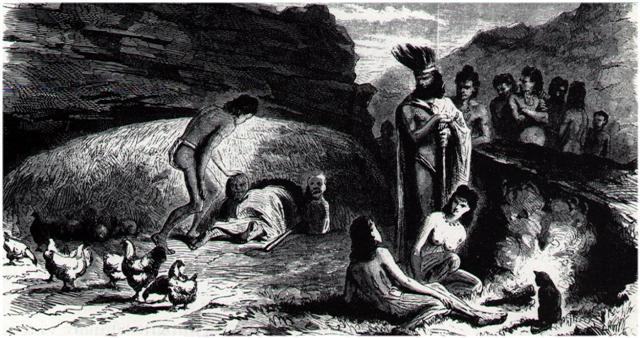 |
| pu.kioe.a Oti.he
tuu.he haka.ūru.i
Uru. 1. To lavish food on those who have
contributed to the funerary banquet (umu pâpaku)
for a family member (said of the host, hoa pâpaku).
2. To remove the stones which have been heated in
the umu, put meat, sweet potatoes, etc., on
top of the embers, and cover it with those same
stones while red-hot. 3. The wooden tongs used for
handling the red-hot stones of the umu. 4. To
enter into (kiroto ki or just ki),
e.g. he-uru kiroto ki te hare, he-uru ki te hare.
5. To get dressed: kahu uru. Vanaga. Uruga.
Prophetic vision. It is said that, not long before
the first missionaries' coming a certain Rega
Varevare a Te Niu saw their arrival in a vision
and travelled all over the island to tell it:
He-oho-mai ko Rega Varevare a Te Niu mai Poike, he
mimiro i te po ka-variró te kaiga he-kî i taana
uruga, he ragi: 'E-tomo te haûti i Tarakiu, e-tomo
te poepoe hiku regorego, e-tomo te îka ariga koreva,
e-tomo te poporo haha, e-kiu te Atua i te ragi'. I
te otea o te rua raá he-tu'u-hakaou ki Poike; i te
ahi mo-kirokiro he-mate. Rega Varevare, son of
Te Niu, came from Poike, and toured
the island proclaiming his vision: 'A wooden house
will arrive at Tarakiu (near Vaihú), a
barge will arrive, animals will arrive with the
faces of eels (i.e. horses), golden thistles will
come, and the Lord will be heard in heaven'. The
next morning he arrived back in Poike, and in
the evening when it was getting dark, he died.
Vanaga. He ui a Ira.ko te motu etoru.he ki a
Ira.he ro korua e kau a repa e ku ketu ana te
urunga.a Hau maka o to tatou matua.i hakahi mai ai
kia au.ko nga kope ririva tutuu vai a te taanga.te
ingoa o te motu ena etoru i nape ai e te kuhane o
Hau maka. Ira saw that there were three such
islets. Ira said, 'Hey you, crew of young men, the
vision of Hau Maka, our father, which he revealed to
me, has come true. There are 'the handsome sons of
Te Taanga, who are standing in the water', for this
is the name that the dream soul of Hau Maka gave
them. (E:17) Uru manu. Those who do not
belong to the Miru tribe and who, for that
reason, are held in lesser esteem. Úru-úru.
To catch small fish to use as bait. Uru-uru-hoa.
Intruder, freeloader (person who enters someone
else's house and eats food reserved for another).
Vanaga. 1. To enter, to penetrate, to thread, to
come into port (huru); uru noa,
to enter deep. Hakauru, to thread, to
inclose, to admit, to drive in, to graft, to
introduce, penetrate, to vaccinate, to recruit.
Akauru, to calk. Hakahuru, to set a tenon
into the mortise, to dowel. Hakauruuru, to
interlace; hakauruuru mai te vae, to hurry
to. 2. To clothe, to dress, to put on shoes, a
crown. Hakauru, to put on shoes, to crown, to
bend sails, a ring. 3. Festival, to feast. 4. To
spread out the stones of an oven. Uruuru, to
expand a green basket. 5. Manu uru, kite.
Uruga (uru 1). Entrance. Churchill. Ta.:
uru, the human skull. Mq.: uu, the
head. Sa.: ulu, id. Moriori: ulu, id.
Uru, make even. Kapingamarangi.
(He) arrived (he
tuu), and made an offering of the hen (he
haka.ūru.i te uha.e
Ngumi), so did Ngumi, |
|
te uha.e
Ngumi.ki
roto ki te hare.kia
Roto. 1.
Inside. 2. Lagoon (off the coast, in the sea). 3. To
press the juice out of a plant; taheta roto pua,
stone vessel used for pressing the juice out of
the pua plant, this vessel is also just
called roto. Roto o niu, east wind.
Vanaga. 1. Marsh, swamp, bog; roto nui, pond;
roto iti, pool. 2. Inside, lining; o roto,
interior, issue; ki roto, within, into,
inside, among; mei roto o mea, issue; no
roto mai o mea, maternal; vae no roto,
drawers. Churchill.
Ana-roto. Spica.
(inserted the hen) into the house, to Oti (ki
roto ki te hare.kia Oti). |
| Oti.he ki.mai a
Oti.kia Ngumi.pe(-)
Said Oti to Ngumi (he ki.mai a Oti.kia Ngumi): |
|
nei ē. ka ūru.ki roto
ka noho.he ūru a Ngumi
'For what reason (penei
ē) this offering into my place (ka
ūru.ki roto ka noho), an offering from
Ngumi (he ūru a Ngumi)
into the house (where I) dwell (ki roto ki te hare he
noho)?' |
|
ki roto ki te hare he
noho. |
|
he ea.a Oti.he
amo i te umu.he puhi.i te Âmo.
1. To clean, to clean oneself: he-âmo i te umu,
to clean the earth oven; ka-âmo te hare, ka
haka-maitaki, clean the house, make it good;
he-âmo i te ariga, to clean one's face wetting
it with one's hand. 2. Clear; ku-âmo-á te ragi,
the sky is clear. 3. To slip, to slide, to glide
(see pei-âmo). Ámoámo, to lick up, to
lap up, to dry; to slap one's body dry (after
swimming or bathing): he-âmoâmo i te vaihai rima.
Vanaga. Umu.
Cooking pit, Polynesian oven (shallow pit
dug in the ground, in which food is cooked over
heated stones); the food cooked in such a pit for a
meal, dinner, or banquet; umu pae, permanent
cooking pit, in a stone enclosure.; umu paepae,
permanent cooking pit with straw cover for
protection from rain and wind; umu keri okaoka,
temporary cooking pit without stone enclosure;
umu ava, very large temporary cooking pit,
made for feasts; umu takapú, exclusive
banquet, reserved for certain groups of persons, for
instance the relatives of a deceased family member;
umu tahu, daily meals for hired workers;
umu parehaoga, inaugural banquet (made on
occasion of a communal enterprise or feastival);
umu ra'e, banquet for fifth or sixth month of
pregnancy; umu pâpaku, banquet on occasion of
the death of a family member. Vanaga. Cooking place,
oven (humu). Churchill.
Samoa,
Maori, Nukuoro, Niue, Tahiti, Hawaii, Mangaia,
Marquesas, Mangareva, Paumoto: umu, oven.
Tonga: ngotoumu, id. Uvea: ngutuùmu,
id. Futuna: ùmu-kai, id. Fotuna: amu,
cooking place. Rapanui: umu, oven;
humu hare, cook house ... The Polynesian radical
is consistently umu. Tonga and Uvea compound
with it a word which in Uvea is distinctly ngutu
mouth and in Tongan we may feel that ngutu
has been specifically differentiated in this
composite. In the Futuna composite the latter
element is merely kai food ... Particular
interest attaches to the discovery of the amu
type in Mabulag and Miriam, western and eastern
islands of the straits and remote from the New
Guinea coast ... The existence of amu in
Fotuna affords us reason to regard the type as
ancient Proto-Samoan, and that Mabulag and Miriam
received it directly and not on secondary loan from
Motu. Churchill 2.
Puhi. 1. To
blow; to light a fire; to extinguish, to blow out;
he-puhi te umu, to light the fire for the
earth oven. 2. To fish for lobsters at night using a
bait (but during the day one calls it hî);
puhiga, night fishing spot. Vanaga. To blow;
puhi mai, to spring up; pupuhi, wind,
fan, to blow, puffed up, to blow fresh, to ferment,
to swell, to bloat, to spring out, to gush, yeast;
pupuhi vai, syringe; pupuhi eve,
squirt; pupuhi heenua, volley; pupuhi
nunui, cannon; pupuhi nui, swivel gun;
ahuahu pupuhi, amplitude; vai pupuhi,
water which gushes forth; pupuhihia, to carry
on the wind; hakapupuhi, to gush, leaven,
volatilize; puhipuhi, to smoke, to smoke
tobacco, a pipe. Churchill. Oti stood up (he
ea), he cleaned the oven, he blew on the
oven - he ea.a Oti.he
amo i te umu.he puhi.i te umu. |
|
umu.he oho.hee aaru.mai
i te hou oone.mai
... She carefully looked around for a place where
the king could settle down
...
hee rarama i te maara
mo noho mo te ariki
... [E:10] ... They
reached the side crater (te manavai) and looked
around carefully ...
he tuu ki te manavai hee rarama ...
[E:18]
Hou. 1. To perforate, to drill. P Pau.:
fakahou, to furrow, to groove, to plow. Mgv.:
hou, ouou, a drill, a wimble, a borer, a
gimlet, to pierce with a drill. Mq.: hou, an
auger, a drill, a wimble, corkscrew, to pierce with
a drill. Ta.: hou, auger, to drill. 2. New,
fresh, modern, recent, young, youth; rae ki te
mea hou, to innovate; hou anei, modern.
Hakahou, to reiterate, reparation, to
restore, to recapitulate; haga hakahou, to
make over, to renew, recovery; avai hakahou,
a loan, to borrow; rere hakahou mai, to
rebound; hakahou iho, to recommence. P Pau.:
hou, young, new. Mgv.: hou, new;
akahou, to renew. Mq.: hou, new, recent,
fresh, young. Ta.: hou, new, recent, before.
Churchill.
One, sand. Oneone (reduplication of
oone which see below), dirty, covered in
soil, in mud. Vanaga. Oone, ground, soil;
mud; dirty, to get dirty. Vanaga. One, sword.
(Cf. oe, dorsal fin; àè, sword.) Ta.:
óé, sword, lance. Churchill. Oone,
sand, clay, dirt, soil, mire, mud, muck, gravel,
filth, manure, dust, to dirty; ao oone,
shovel; egu oone vehuvehu, mud; moo te
oone, shovel; oone hekaheka, mud; puo
ei oone, to daub; kerihaga oone,
husbandman; oone veriveri, mud; oone no,
muck, to dirty, to powder; vai oone, roiled
water; oone rari, marsh, swamp; oonea,
dirty T; ooneoone, sandy; oonevai,
clay T; hakaoone, to pollute, to soil. P
Mgv.: one, land in general, earth, soil. Mq.:
one, sand, beach. Ta.: one, sand,
dust, gravel. Churchill. Miro-oone, model
boat made of earth in which the 'boat festivals'
used to be celebrated. Vanaga.
... on the first day of the year the natives dress
in navy uniforms and performs exercises which
imitate the maneuvers of ships' crews ... Métraux.
(He) went (he oho), (and) carefully (hee)
drove his muddy screw (aaru.mai
i te hou oone) |
|
raro
i te rua.erua te
angahuru.he mai hē
... On the twenty-fifth day [raa]
of the first month ('Vaitu Nui'), Ira and Makoi set
sail -
i te rua te angahuru marima raa o te vaitu nui.i
oho.mai ai a ira.ko Makoi ... [E:17]
... On the eighteenth day of the month of July
('Anakena'), they went on from Hanga Takaure -
i te angahuru mavau o te anakena.i oho ai.mai
hanga takaure ... [E:23]
... They stayed twenty-seven days in Oromanga -
he noho erua te angahuru mahitu te raa i oromanga
... [E:29]
Rua.
1. Two; second; other (precedes the noun); te rua
paiga, the other side. 2. Hole, grave; holes in
the rocks or between the rocks of the coastal
lagoons; he keri i te rua, to dig a hole. 3.
To vomit. Vanaga. 1. Two. P Mgv., Ta.: rua,
id. Mq.: úa. 2. Nausea, seasickness, to
vomit, disgust; hakarua, to vomit, to spew.
PS Mgv.: aruai, ruai, to vomit. Mq.:
úa, id. Ta.: ruai, id. Pau.: ruaki,
id. Sa.: lua'i, to spit out of the mouth;
lulua, to vomit. To.: lua to vomit. Fu.:
lulua, luaki, id. Niuē:
lua, id.
Viti: lua,
id.; loloa,
seasick. 3. Cave, hollow, ditch, pit, hole, beaten
path, grave; rua papaka,
a ditch. P Pau.: rua,
a hole. Mgv.: rua,
a hole in the ground, ditch, trench. Mq.:
úa, dish, hole,
cavern. Ta.: rua,
hole, opening, ditch. Churchill.
Ta.: ruahine,
an old woman. Ma.: ruahine,
id. Ta.: ruaroa,
tropic of Capricorn. Mq.: uaoa,
a constellation, the eleventh month. The sense in
Tahiti is probably that of some constellation which
may be used to determine the position. Ta.:
ruau, an old
man, an old woman. Ha.: luau,
a parent. Churchill. down into a hole (mai raro
i te rua). |
|
oho he tuu he tingai.he
rara.he ōti te rara.
... Then Oroi
would come out immediately and kill the king -
mai kā tingai.i te ariki i a Hotu.e Oroi
... [E:1003]
Rara.
Mgv.: a branch of a tree. Ta.: rara, id. Mq.:
rara, small branches. Sa.: lala, id.
Ma.: rara, id. Churchill. ...
They all turned around and went back (to the
starting place out at sea). Then the ride on the
waves went in the direction of the left side [te
rara maui], and they landed in Apina Iti.
[And gave it the name Apina Iti.] ... [E:32]
Oti.
To come to an end; to suffice, to be enough:
ku-oti-á, it is finished; ina kai oti mo kai,
there is not enough to eat; he-oti á,
there isn't anymore left, it's the last one; it's
enough with that. Vanaga. Ta.: 1. Oti,
presage of death. Sa.: oti, to die. 2. To
cut. Mq.: koti, oti, id. Sa.: 'oti,
id. Ma.: koti, id. Churchill.
Koti. Kotikoti. To cut with scissors
(since this is an old word and scissors do not seem
to have existed, it must mean something of the
kind). Vanaga. Kotikoti. To tear; kokoti,
to cut, to chop, to hew, to cleave, to assassinate,
to amputate, to scar, to notch, to carve, to use a
knife, to cut off, to lop, to gash, to mow, to saw;
kokotiga kore, indivisible; kokotihaga,
cutting, gash furrow. P Pau.: koti, to chop.
Mgv.: kotikoti, to cut, to cut into bands or
slices; kokoti, to cut, to saw;
akakotikoti, a ray, a streak, a stripe, to make
bars. Mq.: koti, oti, to cut, to
divide. Ta.: oóti, to cut, to carve;
otióti, to cut fine. Churchill. Pau.: Koti,
to gush, to spout. Ta.: oti, to rebound, to
fall back. Kotika, cape, headland. Ta.:
otiá, boundary, limit. Churchill.
I.e., 20 (times,
erua te angahuru)
(he) went, arrived (he
mai hē oho he tuu), (and)
'assassinated' (he
tingai) - 'amputated' branches (he
rara.he ōti te rara),
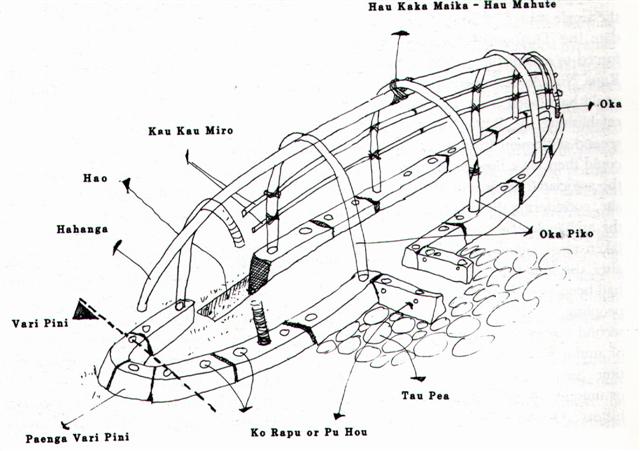
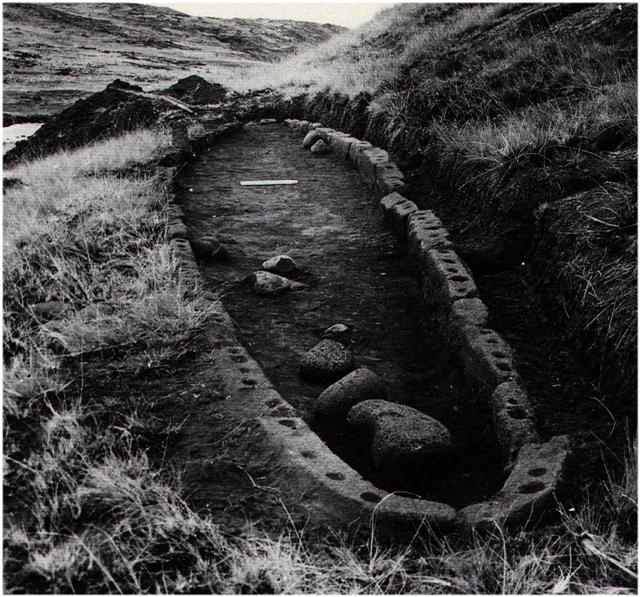 |
|
he hakatēe.hē haī.etahi
popo.o te kioe.he
Te. 1. The,
this, which; ko te,
the. T Pau., Mgv., Mq., Ta.:
te, the.
2. Tê,
negative prepositive; without, not;
hiri tê
reka, to
walk without noise. T Mgv.:
te, no,
not, without: Mq.:
te, not (postpositive). Churchill.
Popo: 1. To put something into something else,
for instance, stones in a boat before going fishing.
2. To enter, to go in; he-popo-mai kiroto ki te
hare, he enters the house. 3. Bundle, bag made
of leaves; to make a bundle, a parcel, to leave
something in a bundle, a parcel. Pôpo: ball;
to make small balls: kete pôpó ki'ea, small
basket with balls of coloured earth. Popohaga,
to dawn; he-popohaga, dawn breaks (one does
not say: i te popohaga, but: i te po-á).
Vanaga. 1. Waves which strike one another. P Pau.:
po-karakara, to strike the hands together.
Mgv.: po-kara, to clap the hands loudly and
gently in alternation. Ta.: popo, to clap the
hands. 2. To wrap up, to bundle, to preserve, to put
in safety. Pau.: hakapopo, to make into a
ball. Mgv.: popo, to take care of a fish net.
3. Pau.: popo, ball, sphere. Mgv.: popo,
ball. Ta.: popo, id. Mq.: popo, id.
Ha.: popo, id. Popohaga, morning;
popohaga atatehe, id. Mq.: popoui, id.
Popokai (popo 2 - kai 4): hare
popokai, store-house. Popopopo, to
deteriorate. P Mgv.: popopopo, entirely
rotten, decayed. Mq.: popo, worm-eaten,
decayed. Poporakau (popo 2 - rakau
2) store, warehouse. Churchill. disintegrating him
(he hakatēe),
by making a bundle (hē
haī.etahi popo) of the rat (o
te kioe), |
|
uru.i te umu.he taō.kia
kia.he ea.he ma(-)
Tao. 1. To
cook in an oven, to sacrifice. P Mgv., Mq., Ta.:
tao, to cook in an oven. 2. To carry away. 3.
Abscess, bubo, scrofula, boil, gangrene, ulcer,
inflammation, sore. Mgv.: taotaovere, small
red spots showing the approach of death. Mq.:
toopuku, toopuu, boil, wart, tumor. Ta.:
taapu, taapuu, scrofula on neck and
chin. 4. Mgv.: a lance, spear. Ta.: tao, id.
Sa.: tao, id. Ma.: tao, id. 5. Mgv.:
taotaoama, a fish. Sa.: taotaoama,
id. 6. Ta.: taoa, property, possessions. Ma.:
taonga, property, treasure. Churchill.
Sa.: tao, to bake; taofono, taona'i,
to bake food the day before it is used; tau,
the leaves used to cover an oven. To.: tao,
to cook food in a oven, to bake. Fu.: taò, to
put in an oven, to cook. Niuē:
tao, to
bake. Uvea: tao,
to cook, to bake. Ma., Rapanui: tao,
to bake or cook in a native oven, properly to steam,
to boil with steam. Ta.: tao,
the rocks and leaves with which a pig is covered
when cooking; baked, boiled, cooked. Mq., Mgv., Mg.,
Tongareva: tao,
to bake in an oven ... The word refers to the
specific manner of cookery which involves the pit
oven. The suggestion in the Maori, therefore, does
not mean a different method; it is but an attempt
more precisely to describe the kitchen method, a
very tasty cookery, be it said. The suggestion of
boiling is found only in Tahiti, yet in his
dictionary Bishop Jaussen does not record it under
the word bouillir;
boiling was little known to the Polynesians before
the European introduction of pottery and other
fire-resisting utensils ... Churchill 2.
Kao-kao, v. Haw.,
be red. Root and primary meaning obsolete in Haw.
Sam., tao,
to bake. Marqu., tao,
bake, roast, sacrifice. Tah., tao,
baked, boiled, cooked. Greek, καιω,
Old Att. καω,
to light, kindle, burn, scorch. According to Liddell
and Scott, Pott refers καιω
to Sanskrit çush,
be dry, but Curtius rejects this. In Dravid. (Tamil)
kay, to
be hot, burn. Fornander.
to be put into the oven (he
uru.i te umu), to be baked for the white
bird (he taō.kia kia):
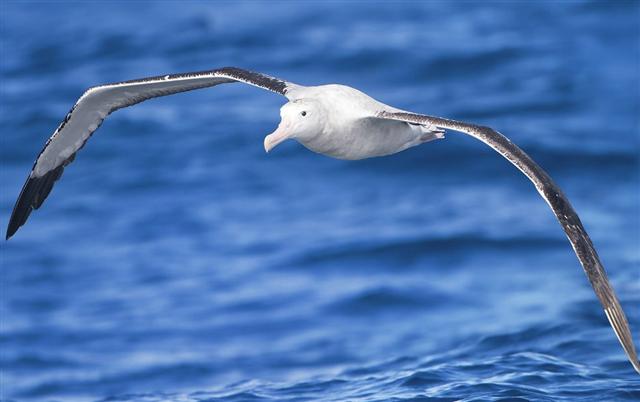
...
Beyond the last type of yam (at Bharani) came 21
types of kumara (sweet potatoes):
|
he kumara → 21 * 20 = 420 = 7 * 60 = 6 * 70 |
|
1 |
he hiva matua |
a Bau. a Oti. |
|
2 |
he hiva poki |
|
3 |
he renga moe tahi teatea |
|
4 |
he renga moe tahi uriuri |
|
5 |
he uru omo. |
|
6 |
he ree aniho. |
|
7 |
he ha.u pu.uriuri |
|
8 |
he ha.u.pu.teatea |
|
9 |
he okeoke |
|
10 |
he apuka. |
|
11 |
he ure vai. |
|
12 |
he paiki. |
|
13 |
he uriuri. |
|
14 |
he piu tahi. |
|
15 |
he tuitui koviro. |
|
16 |
he aro piro. |
|
17 |
he pekepeke mea. |
|
18 |
he pekepeke uri. |
|
19 |
he aringa rikiriki. |
|
20 |
he tua tea. |
|
20 he mamari kiakia.
(BEID *62) |
The
star Beid (the Egg in the Eridanus River,
He Mamari Kiakia) was the last one to be
mentioned - and notably it was given number 20
instead of the expected 20 + 1
... |
|
oa.mai.he ā.pa mai
etahi tukunga. Riva maoa,
correct. Churchill.
Pa. 1.
Mgv.: pa, an inclosure, a fenced place. Ta.:
pa, inclosure, fortification. Mq.: pa,
inclosure. Sa.: pa, a wall. Ma.: pa, a
fort. 2. Mgv.: pa, to touch. Sa.: pa'i,
id. Ma.: pa, id. 3. Mgv.: pa, to
prattle. Ta.: hakapapa, to recount. 4. Mq.:
pa, a hook in bonito fishing. Sa.: pa,
a pearlshell fishhook. Ma.: pa, a fishhook.
Pau.: hakapa, to feel, to touch. Mgv.:
akapa, to feel, to touch, to handle cautiously.
Tukuga, mat spread on the ground;
tukuga tagata, mat on which have been put pieces
of cooked human flesh.
(He) stood up (he
ea) in due fashion (he
maoa.mai), (and) closed (he
ā.pa mai) the mat spread out on the ground (etahi
tukunga). |
| Ngumi
Cfr: ...
ko Ngukuu.
a Hua tava.ko
Ringiringi a Hua tava.ko Nonoma.a Hua tava.ko Uure.a
Hua tava. Ko Makoi.a Huatava. [E:15] Gutu. 1. Lips, mouth, beak, snout (goutu);
gutu ahu, swollen lip; gutu hiti, thick
lip; gutu mokomoko, pointed lip; gutu
no, vain words; gutu pakapaka, scabbed
lips; gutu raro, lower lip; gutu ruga,
upper lip. Gutugutu, snout. P Pau.: gutu,
lip, beak, bill. Mgv.: gutu, the chin, the
mouth of a fish. Mq.: nutu, beak, snout. Ta.:
utu, lip, mouth, beak, snout. Gutupiri,
attentively. Gututae, attentively; gututae
mekenu, a small mouth. Gututika, tattoing
on the lips. 2. Pau.: Gutuafare, to save, to
economize. Ta.: utuafare, family, residence.
3. Pau.: Guturoa, to grimace, to pout. Mgv.:
guturoa, to grimace. Churchill.
... It grew light [he otea] and Teke went out
[he ea a Teke ki haho] in the twilight to
urinate [i te po ana
mimi]
... [E:59]
... On the
fifteenth day of the month of October (tangaroa
uri), Nonoma left the house [he ea mai roto i
te hare] during the night [i te po] to
urinate outdoors [ki kaho.mimi] ...
[E:75]
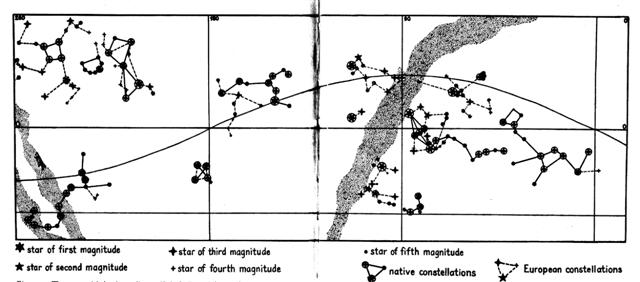
 |
99 |
 |
 |
 |
 |
77 |
 |
|
84 |
*104 |
... the distance from Aldebaran to
Antares had grown over time and in 5000
BC the distance from Aldebaran to
Antares was around 177 (= 3 * 59) nights
... |
265 |
|
ALDEBARAN |
AL SHARAS (The Ribs)
|
ANTARES |
|
MARCH 25 |
JULY 3 |
EQUINOX |
|
"April 17 (107) |
"July 26 |
Tagaroa Uri 15 (288) |
|
14
* 13 = 182 |
|
|